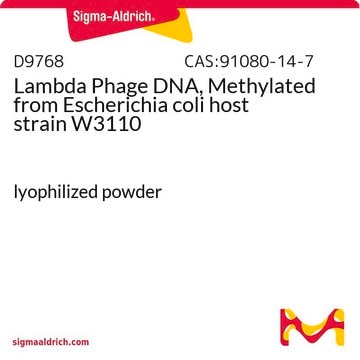10745782001
Roche
DNA, lambda
from bacteriophage lambda cl857 Sam 7
Synonym(s):
lambda dna
Sign Into View Organizational & Contract Pricing
All Photos(1)
About This Item
UNSPSC Code:
41106310
Recommended Products
Quality Level
form
solution
mol wt
32,300 kDa
packaging
pkg of 1 mL
manufacturer/tradename
Roche
storage condition
avoid repeated freeze/thaw cycles
concentration
250 μg/mL
impurities
RNA, none detected
nuclease, none detected
color
colorless
solubility
water: miscible
shipped in
dry ice
storage temp.
−20°C (−15°C to −25°C)
General description
The DNA of bacteriophage lambda contains 48,502 nucleotide pairs forming a linear duplex. The 5′ ends of this DNA molecule have self-complementary single-stranded protrusions of 12 nucleotides that can anneal to form circles. Upon entry into the host cell, the DNA circularizes in the presence of DNA ligase. Many such circles are generated during the early lytic infection. At a later stage in replication, these individual circles/rings are converted to linear concatemers by a process called rolling-circle replication. The linear concatemers are cleaved during packaging to form monomeric chromosomal units by the enzyme DNA terminase.
Application
DNA, lambda has been used to spike peripheral blood leukocytes (PBL) before genomic DNA isolation. It has also been used in the preparation of biotinylated double-stranded DNA (dsDNA) substrate.
Quality
The DNA shows the typical cleavage pattern for wild type λDNA in gel electrophoresis after cleavage with restriction endonucleases EcoR I and Hind III.
Sequence
Chain Length 48,502 bp
Physical form
Solution, 250 μg/ml, in 10 mM Tris-HCl, 1 mM EDTA, pH 8.0, ready-to-use
Storage and Stability
Store at -15 to -25°C until use; once thawed, store at 2-8 °C.
Other Notes
For life science research only. Not for use in diagnostic procedures.
Storage Class Code
12 - Non Combustible Liquids
WGK
nwg
Flash Point(F)
No data available
Flash Point(C)
No data available
Certificates of Analysis (COA)
Search for Certificates of Analysis (COA) by entering the products Lot/Batch Number. Lot and Batch Numbers can be found on a product’s label following the words ‘Lot’ or ‘Batch’.
Already Own This Product?
Find documentation for the products that you have recently purchased in the Document Library.
Customers Also Viewed
Bacteriophage lambda DNA: the beginning of the end.
A Becker et al.
Journal of bacteriology, 172(6), 2819-2824 (1990-06-01)
Rachel Howard-Till et al.
BioTechniques, 70(2), 120-125 (2020-12-15)
Genetic characterization of wild and cultivated plants provides valuable knowledge for conservation and agriculture. DNA sequencing technologies are improving, and costs are dropping. Yet analysis of many species is hindered because they grow in regions that lack infrastructure for advanced
Isolation of high quality DNA and RNA from leaves of the carnivorous plant Drosera rotundifolia.
Bekesiova I, et al.
Plant Molecular Biology Reporter, 17, 269-277 (1999)
Shaun Wynyard et al.
Journal of virological methods, 175(1), 95-100 (2011-05-07)
Porcine Endogenous Retrovirus (PERV) poses an infectious risk in the field of xenotransplantation. This risk may be mitigated by breeding selectively animals bearing favorable PERV genetic characteristics including pigs with low levels of PERV integrated in the genome. A real-time
Darren Yang et al.
Nature communications, 7, 11026-11026 (2016-03-18)
We present a miniature centrifuge force microscope (CFM) that repurposes a benchtop centrifuge for high-throughput single-molecule experiments with high-resolution particle tracking, a large force range, temperature control and simple push-button operation. Incorporating DNA nanoswitches to enable repeated interrogation by force
Our team of scientists has experience in all areas of research including Life Science, Material Science, Chemical Synthesis, Chromatography, Analytical and many others.
Contact Technical Service







